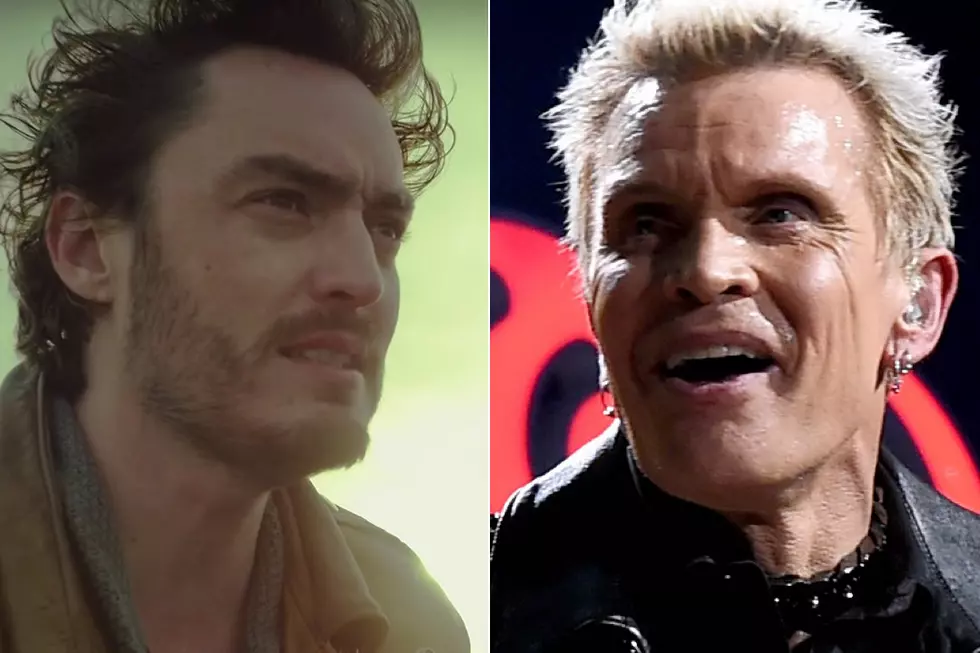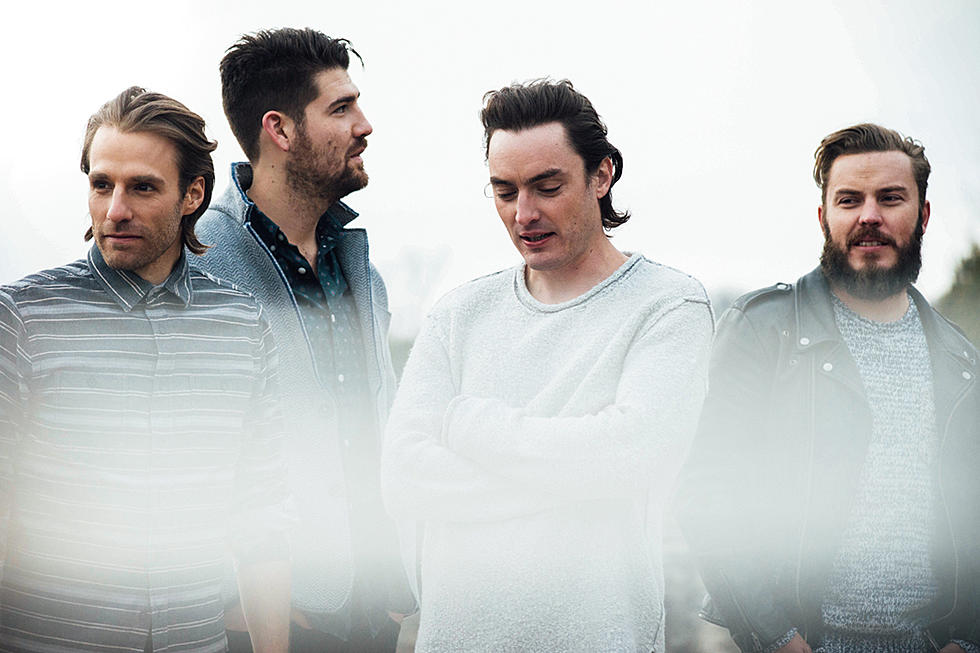
Civil Twilight on Writing Songs, Going Acoustic + Recording ‘Story of an Immigrant’
Civil Twilight have been playing together since they teens in Cape Town, South Africa; even after all those years together, the alt-rockers have not only grown as musicians and performers but also as songwriters.
On their latest effort, Story of an Immigrant, out now via Wind-up Records, guitarist Andrew McKellar, drummer Richard Wouters, singer, keyboardist and bassist Steven McKellar and keyboardist and vocalist Kevin Dailey took a different approach toward their recording process. Aside from teaming up with Grammy-winning producer Ben H. Allen (Cee-Lo Green, Kaiser Chiefs, Animal Collective), they also decided to record the album live -- something the band hasn't done since their 2010 self-titled debut.
McKellar and Wouters sat down with Diffuser during a recent visit to New York City and discussed their revived recording process, working with Allen and why they enjoy playing their songs acoustically. Check out our exclusive chat below:
How was the approach to this album different from your past work?
Steve McKellar: One big difference was that we have a fourth [band] member. He joined us three years ago when we started touring on the second record. It was our first time writing with him. So that was a big change for everyone, including him. I think for us, we wanted to get back to writing in a room together. The second record we did was very much not that. It was taking songs into the studio and hashing them out there. But this time around, it's about recording them live and really get that live energy. So getting back to that place took a little while. The first record was like that, and it's been awhile since we've done.
What were the challenges of recording an album like that?
Richard Wouters: We took a long time to write this record and not rush the writing process. We took almost a year and a half probably. We didn't do much. We just focused on writing. We worked on a lot of ideas, like 50-plus product demos. Then we went into the studio with a producer and cut it down to 12 or 13 [songs].
McKellar: We got along like peas and carrots in the studio actually. The writing process is where we really hashed out the ideas. Then once we hit the studio, it was like [claps hands]. We worked with the producer, Ben H. Allen, in his home studio [in Atlanta].
Wouters: It was a lot of fun.
McKellar: You know it's going well if you feel like a kid in a toy store, you know? That's when you know it's going well.
Aside from the singles you've already released, is there a deeper cut that you found the most memorable?
Wouters: There's a song called "Let It Go" on the record, which is an unfortunate name, but it was written quite a while ago. In the studio, that was one of the songs that changed quite dramatically. It went in a very different direction. It was a cool process, and I like the way it came out.
McKellar: Actually, "Story of an Immigrant" was similar. Yeah, the original demo was the same chords, same feeling and same lyrics, but Ben was reluctant to work on it because it sounded exactly like another song we were working on at the time. So he just ignored it. And then we brought it up again and said, "Let's try to make it something special." And it turned out nothing like what we planned. So that was an interesting experience. Quite a few songs [on the album] have that evolution story to them.
Wouters: We definitely had a different idea of what we wanted to focus on in the studio -- not necessarily what we wanted the music to sound like but what we wanted to achieve in terms of the elements that we felt were our strengths that we wanted to come through on the record. That helped us to focus in the studio.
What was it like working with Ben H. Allen?
McKellar: When we were [initially] working with him, we were sussing him out. And what we liked about him is the fact he had a specific vision for every song and had an idea for what the record could be. And I think we needed somebody who was going to be a little more forceful, a little more opinionated and willing to fight for their opinion but at the same time was also willing to work with us. He's just got a little more vision, but it's not like the guys we've worked with in the past didn't have that at all. He just had this certain personality that's unlike any of ours where we got some of that push and pull. He's a real pro and real hard worker and really focused and a lot of fun. So all those elements really helped us to be ourselves I think. We didn't have to carry anything but our role.
Wouters: He helped push us as players. He wasn't afraid to tell us what he thought about things and say, "Stop playing like girls and play like a rock band." But we needed that. We wanted someone who would challenge us.
McKellar: I think we got into a stump before we met him. Like we were working on demos for a year, and it was soft and p---y and jazzy like so many genres shoved into one song. And he just blew them out of the water and got us very focused, and that was very nice.
We premiered an acoustic version of the title track back in April. It shows a different side of Civil Twilight. Can you talk about how you approach the band's acoustic versus electric sounds?
McKellar: It's really great to break our songs into the acoustic version. For me personally, it's the best way to see if we have a song or not. If you could play it acoustically without anything else and it still shines melodically and harmonically … so we actually did an acoustic version of all the songs on the record and then recorded them. It was very encouraging because they were the songs you could actually play on piano or keyboard. I think that's the benefit of breaking [the songs] down, getting down to the soul of the songs. It actually helps us play them in rock settings because that's what you're trying to do -- find the soul of the song. For me, it's easy to get to the soul of the song when it's quiet. It's just three elements, and then you can start adding things.
Wouters: We're actually really comfortable in that setting, where it's just acoustic, because we grew up together just playing in a room. It's kind of how we learned to play -- playing off each other and just listening. So that's kind of fun for us.
What's "Holy Doves" about?
McKellar: I won't tell you what the song is about, but the song was written in the early demo stages. It was a riff that Kev [Dailey] was just playing with in the demo stages. It was just a fun thing and exactly what we needed as a band to help us get to that place. We were trying not to take ourselves so seriously and not make everything so dramatic, and that song was one of the keys to that door. That was the first time we played and ever wrote anything like that, just a blues-riffed based song. We'd never done that before. It was very liberating.
Wouters: It's funny that "Doves" is the first official single because it's kind of different from what we've done. And it's kind of different from the rest of the record.
What are your plans now that the album is out?
Wouters: We're working on touring now for the summer and fall.
McKellar: Yeah, we'll be hopping around the [U.S.].
Story of an Immigrant is the band's third album, but you have been playing together for a really long time. What keeps you wanting to continue making music?
McKellar: That's a very deep question. I think we've all had our moments.
Wouter: There's good things and bad things about everything in life. There's challenges, and there's exciting things. And you just try to focus on the good things.
McKellar: You just focus on the good things, and at some point, you just have to realize that you're a lucky bastard to be able to do this for a living. If you can't appreciate that, then I don't think there's anything you can appreciate in the world. We're extremely blessed to be doing this, and the thrill isn't gone. It still feels like we're playing in our garage. That same thrill we got then, we still feel now.
More From Diffuser.fm









